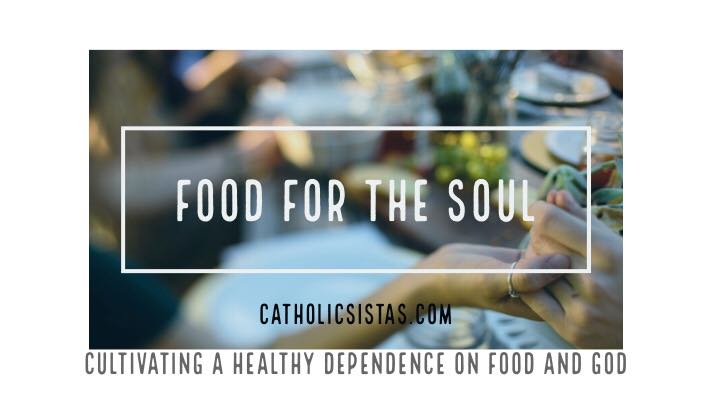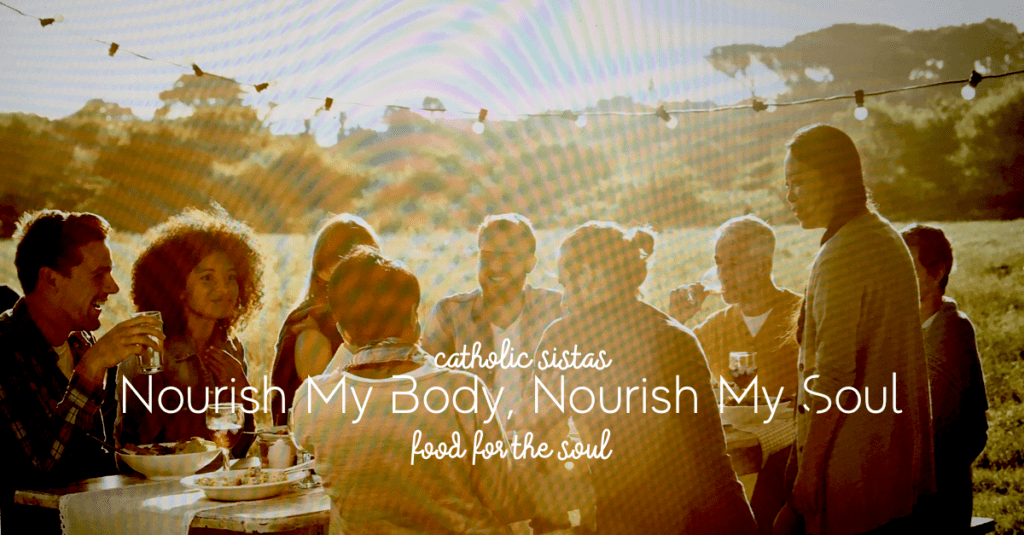
Although what we eat plays an important part in nourishing our body, where we eat and with whom we eat nourishes our soul. This month we’ll dig into the weeds of our triggers and temptations and be more mindful of the lies and truths we have to choose between in our relationship with food and eating. This month, we’ll focus on the importance of the table. Eating together was an important aspect of early Christian life and we can see throughout the New Testament how Jesus found significance in sharing a meal with others.
So far in this series, we’ve taken a broad view of our relationship with food and an understanding of where we’ve learned to place its importance in our lives. Just as Eve took her eyes off of God during the fall, we too need to refocus and learn from Jesus’ example of his response towards temptation. We turn to God in prayer, invite Him into our struggle and acknowledge where we are and where we want to be.
Our first step comes from the scene in the Upper Room, our Eucharistic story where we will focus on the words Take, Bless, Break, and Share and the significance they play in our desire to trust God to nourish our body and soul.
At every Jewish ritual meal, the main points are the blessing and the sharing. The blessing recognizes that this bread is set apart for holy things. The sharing is a sign of communion with one another. For the Jewish ritual, the taking and the breaking are of secondary importance. You can’t give the bread to others unless you break it, and it’s hard to break the bread unless you take it into your hands.
(Taken from a homily by Paulist Fr. Rich Andre)
TAKE – To Be Set Apart For A Purpose
In Fr. Andre’s homily he likens the word taken to the word chosen and points to Matthew 18:20 where Jesus at the Last Supper tells the Apostles, It was not you who chose me, but I who chose you. Each of us is chosen for a unique purpose, but we need a community to carry that purpose out.” That sentiment is not lost when we consider that we, too, have been given the people in our life for a purpose. We have been chosen to “do” life with one another for a purpose and what better way to communicate and grow than around the table.
The table has always been an important place of connection for my family. Hospitality is my love language. Preparing a meal for those I love and care for brings me immense joy. One of the most consistent things my husband and I did, as we raised our family, was to eat together every night. Over our 30 years of parenting, there was a small percentage of time that we were unable to do this. It provided our children with a place to be known, understood, accepted, and loved – even on difficult days when life was less than perfect. Whether the conversations were deep or silly, our connecting with one another created sacred space where God provided wisdom, healing, and joy.
However, this tradition came to an abrupt halt as our children left home, one by one, within a few short months of one another. My ten-foot table, the center of our celebrations and everyday conversations, was extremely empty. As you can imagine, there were a lot of emotions as my husband and I learned to navigate this new part of our lives. For me, it was a time where mindless over-eating became the ritual that fed the emotion of loss. In my journey towards better health, I began to realize that the emotion wasn’t going to go away with whatever I was feeding it – I needed something bigger and deeper. I needed God’s truth. By turning to scripture, I found passages that spoke God’s truth to my emptiness and fought the lies that were drowning out His message to me. I saw that although my mind viewed this change as loss, it was merely a change; a chapter’s end where another was to begin. Once I moved past using food to feed the emotion, I came up with a plan and/or mindset that was a better fit. For instance, Sunday dinners with the family, a dinner party with friends, and romantic dinners (candlelight and all) with just my husband and I.
I fear, in our fast-paced world, that we have forgotten that the table is more than a place to fuel our bodies, it is a place to nourish our hungry hearts as well. The table has a significant purpose so keep those conversations going. Ask questions. Share dreams. Ask if there’s someone they know that needs prayer – then pray, right there and then. Share stories about your childhood or teen years. Talk about family members who are no longer here or those who may be alone. Better yet, invite someone who may be alone over and listen to their stories. The important thing is to build memories! Memories connect us, teach us, and comfort us.
BLESS – To Acknowledge God’s Providence
We are a relational people, made for community. God created us to be in communion with one another. Throughout scripture, God chooses to gather us around a table to celebrate, to listen, and to learn. For our family, being together at a meal meant more than nourishing our body, it was where we gathered to connect our lives to one another. It was a place where we thanked God for providing us with the gift of food and each other.
When I think of the Upper Room and how scripture recalls, with such detail, how the Passover Sedar was to be prepared, I’m reminded of the great love God has for His people as He feeds their soul. And Jesus always showed his gratitude by giving thanks to the Father and blessing however little was before him. God always manages to multiply the blessings when our hearts are grateful.
In everything give thanks: for this is the will of God in Christ Jesus concerning you. 1 Thesselonians 5:18
The importance of thanking God for the gift of food and not taking it for granted. In every account where Jesus fed people, scripture tells us that he gave thanks. He teaches us that the table is the place to remember the blessings of God.
To truly give thanks is to understand that there is more to be thankful for than just the fact that the meal made it to the table on time. We are so disconnected from our food sources. We hop on over to the nearest grocery store or make a phone call and magically food appears at our doorstep. It’s easy to forget the true privilege we have been given. To stop and think about the process of God creating the earth (the rain, sun, and soil), which the farmer cares for and harvests, brings a much deeper meaning to the blessing. Then add the people who deliver the food to the grocer and those who have prepared the meal. Take time to remember those who do not have easy access to food sources or cannot afford such luxuries. Pray for the friends and family that are seated with you to share a meal and remember those who are truly alone. With generous thought, comes generous gratitude.
He humbled you, causing you to hunger and then feeding you with manna, which neither you nor your ancestors had known, to teach you that man does not live on bread alone but on every word that comes from the mouth of the Lord. Deuteronomy 8:3
As our bodies are nourished through a communal meal, memories are made and we are drawn closer to one another. Just as Jesus appeared to Cleopas and the unknown disciple, we too, see him in the breaking of the bread.
The feeling elicited by food’s memories are powerful and should also be taken into account as an emotional eater. Perhaps you don’t know why you are “powerless” with certain foods. Ask yourself, “did I enjoy (or not) this food previously in my life”? Does steak on a grill bring back great memories of picnics with your mom and dad? Or coffee brewing or cinnamon buns remind you of special moments with a grandparent? Asking God to reveal those memories to you can open a door to understand why you may have a weakness in that area. Just remember, food doesn’t feed the emotion. Turn back to God’s truth about the emotion.
Next month we will touch on the last two words of our Eucharistic blessing – Break & Share.

